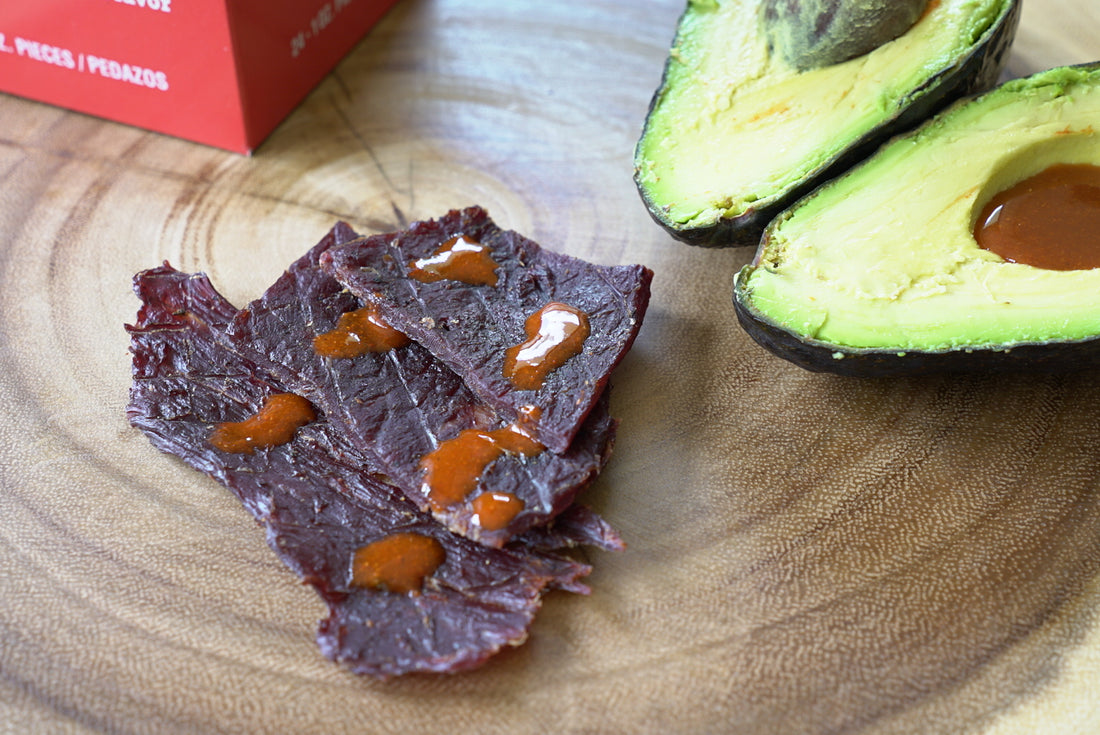
Is Beef Jerky Good for You? Health Aspects to Consider.
Share
Beef jerky is a popular snack food for many people looking for a high-protein, low-carb treat they can indulge in. With lean cuts of beef, this dry, salted meat can be a much healthier option for people looking for something to snack on. However, like anything, beef jerky isn't perfect. With many different types of marinades, sauces, and spices, a relatively healthy product can turn bad quickly. Even so, good quality beef jerky can be a great addition to a balanced diet. Here are some things to look for.
Jerky Is High In Protein

Beef jerky, in its most natural form, is almost always a low-carb, zero-sugar snack. One reason you might reach for a bag of beef jerky is for an extra boost in protein. Protein is an amino acid that has some good benefits. For example, eating protein burns more calories than other sources such as carbohydrates or fats. It's because of the thermic temperature your body needs to break down the protein that this happens. Studies have also shown that a diet higher in protein can boost metabolism as well.
Another interesting discovery is that eating protein reduces your body's production of the hunger hormone ghrelin. That means protein has the ability to curb your hunger. If you're less hungry, you'll eat less, and that could help you lose more weight.
High in Sodium
There are many types of processed meat. Foods like hot dogs, bacon, bratwurst, and salami are just a few examples of processed meats you may already include in your diet. Beef jerky is also a type of processed meat. The main concern with processed meats is that they are high in sodium. High blood pressure and cardiovascular disease are a couple of risk factors to consider with diets high in sodium. Certain cancers, such as colon cancer, have also been linked to processed meats. However, with a balanced diet, consuming processed meats shouldn't be a huge concern. Beef jerky probably shouldn't be eaten every day, but with a long shelf life (up to a year), you can be assured that a recently purchased bag of jerky can still be a delicious option in the future.
Allergens & Intolerances
One of the first steps in making any jerky is the marinating process. Depending on the flavor or type of beef jerky you are eating, the marinade of the product can vary widely. One very popular ingredient in a lot of jerky marinades is soy sauce. This is because soy sauce has a very rich and concentrated salty flavor. However, soy can be an allergen for some people. Soy sauce also commonly contains wheat. While it's not a significant amount, wheat has gluten, which can cause intolerance in some individuals. It's important to read the ingredient list of the jerky you buy so that you can be informed about any allergens or intolerances that might be present.
Low Carbohydrate

One great benefit of Beef Jerky is that it's almost always a low carbohydrate snack food. The science in favor of low carb diets has been around for a long time, especially when you consider metabolic illness. Type-2 Diabetes for example continues to be a growing problem in America. Sufferers of this illness need to be more conscious of the foods they eat, importantly high carb foods. Many experts have linked high carb diets to the rise of Type-2 Diabetes.
This is where beef jerky can play a role. Jerky in it's most natural state should always be a low carb snack for people to enjoy. Now be careful, because It's important to know that some Jerky companies do add sugar to their product. That alone will add refined carbohydrates to the final product. Always check the nutrition information to know what your beef jerky contains.
Sugar
Sugar is becoming more of a problem in the Jerky industry. Big Jerky brands use sugar because they believe it makes their products more flavorful. It also traps water weight, which means they can use less beef. That said, sugar is very addictive, because it triggers the release of dopamine in the brain. If you're not careful you could go down the path of craving more sugar in your diet. Diets high in sugar are often linked to inflammation, which is a contributing factor for many cancers in the body.
At El Norteño we believe beef jerky should have little to no sugar. It's our opinion that people look to jerky as an alternative high carb, high sugar snacks. Adding sugar to your jerky products defeats that purpose.
Nitrates & Nitrites
Preserving meat goes back thousands of years, and from the beginning early humans were using salt as their primary tool for preservation. However in that time period the primary salt used is what we know today as sodium chloride. As time passed the discovery of sodium nitrites made preservation significantly better. The power of these nitrite salts stopped bacteria born illness like botulism in it's tracks.

Today there's some confusion about Nitrates & Nitrites. Here's what you should know.
- Nitrites are created when bacteria converts nitrates into nitrites. For example, the bacteria in our mouths can convert nitrates into nitrites.
- The majority of nitrates/nitrites we consume come from green leafy vegetables. Nitrites found in cured meats make up around 5% of nitrites consumed in a typical American diet.
- Most cured meats have around 0.00002 and 0.004% of nitrites in them. That's because during the curing process, the nitrates/nitrites are broken down into safer compounds. You would have to eat around 10,000 serving to get a lethal dose of these sodium compounds.
- Studies show that when nitrites and protein are combined and exposed to high cooking temperatures over >300°F that a carcinogen known as nitrosamines can be created. This can pose a small risk for human consumption. Most beef jerky is cooked at around 160°
- All-Natural Jerky's typically use a natural occurring nitrite found in celery juice. However, this is the exact same compound found in sodium nitrites. It's important to note that it would react in the same way if combined with protein and high cooking temperatures. The source makes no difference in this case, but public perception plays a role in why companies opt for celery juice.
In conclusion, Nitrites play an important role in preserving meat and stopping bacteria growth. While nitrites are classified as a toxin it would require very large consumption of cured meat to get a lethal dose. In fact a spinach salad provides around the same amount of nitrites that would be found in a ham sandwich. That's because nitrites occur naturally in almost all green leafy vegetables. In fact nitrites play an important role in regulating our own blood pressure. Unless you're eating a lot of cooked processed meat, such as bacon or hot dogs, the risk associated with nitrates/nitrites is very small.
Low Glycemic Index
One great aspect of beef jerky is that it's very low on the Glycemic Index scale. Because it's a very low carb food you don't have to worry about high blood sugar spikes. However, make sure you're eating jerky with no added refined sugars. This can make a drastic change in how your body reacts to the beef jerky you're consuming.

Final Words
As you can see, beef jerky gives us a lot to think about. There isn't one clear answer here. It offers many benefits that we can appreciate while also giving a reasons to not eat too much of it too often. Can Jerky be included in a balanced diet? Most certainly. As metabolic illness rise in the United States, jerky is a great option for those looking to snack on something other than high-carb potato chips or sweets. As long as we stay in front of what we're eating there's no reason to believe that adding jerky to your diet will be of any hindrance. Always know what's in your jerky before eating it and feel confident in it's benefits.
